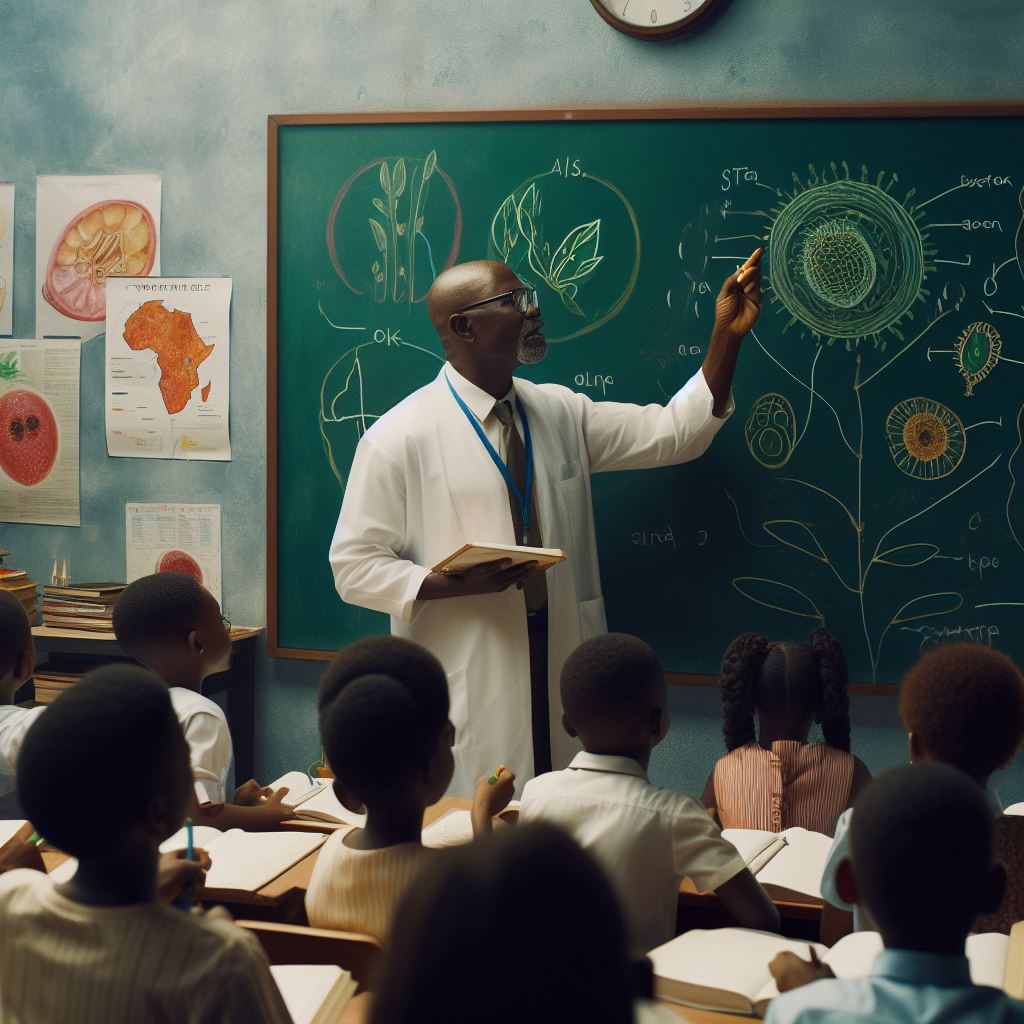Introduction
In this blog post, we will explore the Nigeria Ed System with Global Models.
Nigeria’s education system plays a crucial role in shaping the nation’s development and future.
It is imperative to examine its strengths, weaknesses, and potential areas for improvement by comparing it with global models.
This comparison will provide valuable insights that can ensure the provision of quality education for Nigerian students.
Evaluating Nigeria’s education system in relation to global models is a significant endeavor as it enables us to identify the areas where Nigeria excels and those that require attention.
By understanding the similarities and differences, we can implement effective strategies and policies to enhance the quality of education in Nigeria.
This comparison will also empower policymakers, educators, and stakeholders to adopt best practices from around the world, consequently setting Nigerian students on a path toward success and international competitiveness.
Overview of Nigeria’s Education System
The synergy between the Nigeria ed system and global models cultivates a more holistic approach to learning.
Historical background and development of the education system
- Nigeria’s education system has evolved over time to address the country’s changing needs.
- During the colonial period, education in Nigeria was provided primarily by Christian missionaries.
- The introduction of Western education played a significant role in shaping Nigeria’s education system.
- The Nigerian government took over the responsibility of providing education after gaining independence in 1960.
- Efforts were made to expand access to education and promote national development.
Structure of the educational system in Nigeria
- Nigeria’s education system is divided into three levels: basic education, secondary education, and tertiary education.
- Basic education consists of six years of primary school and three years of junior secondary school.
- Secondary education comprises three years of senior secondary school.
- Tertiary education includes universities, polytechnics, and colleges of education.
- Education is mainly conducted in English, which is the official language in Nigeria.
Significant challenges and issues faced by the Nigerian education system
- Access to quality education remains a major challenge in Nigeria.
- Inadequate funding has resulted in a lack of resources and poor infrastructure in many educational institutions.
- There is a shortage of qualified teachers, especially in rural areas.
- Educational inequality is prevalent, with disparities between urban and rural areas, as well as between different socio-economic groups.
- High levels of corruption and mismanagement have further hampered the development of the education system.
- The rapid population growth in Nigeria puts additional pressure on the education system.
- Insufficient attention to vocational and technical education limits opportunities for skill development and employment.
- The curriculum needs to be updated to align with the changing needs of the global economy.
- Security challenges, such as terrorism and conflicts, have disrupted education in certain regions.
- Gender inequality persists, with lower enrollment rates and limited opportunities for girls in some parts of the country.
In essence, Nigeria’s education system has made progress in terms of access and infrastructure, yet it faces significant challenges.
Improving funding, addressing teacher shortages, reducing inequality, and adapting the curriculum are crucial for the development of a quality education system that meets the needs of Nigeria’s diverse population.
Read: Nigeria’s Global Entrepreneurship Ranking: The University Effect
Comparison of Nigeria’s Education System with Global Models
Implementing global models in the Nigeria ed system promotes innovation and modernization.
Education system in developed countries (e.g., United States, United Kingdom)
- Curriculum and subjects offered: In developed countries, the curriculum is comprehensive and diverse, offering a wide range of subjects to students.
- Emphasis on critical thinking and practical skills: These countries prioritize critical thinking and practical skills development, encouraging students to think creatively and apply knowledge to real-life situations.
- Teacher qualifications and training programs: Teachers in developed countries undergo rigorous qualifications and training programs to ensure they are highly skilled and knowledgeable in their respective fields.
- Evaluation and assessment methods: Developed countries utilize a variety of evaluation and assessment methods, such as standardized tests and performance-based assessments, to measure student progress and identify areas for improvement.
Education system in developing countries (e.g., India, South Africa)
- Access to education and enrollment rates: In developing countries, access to education is often limited, resulting in lower enrollment rates compared to developed nations.
- Quality of infrastructure and resources available: The quality of infrastructure and resources in developing countries may not be at par with developed nations, hindering the overall learning experience.
- Inclusion of marginalized groups and gender equality: Developing countries may face challenges in ensuring the inclusion of marginalized groups and promoting gender equality within their education systems.
- Government policies and investments in education: Government policies and investments play a crucial role in the success of education systems in developing countries.
However, limited resources and competing priorities can impact progress.
In fact, Nigeria’s education system can be compared to both developed and developing countries.
While the curriculum in developed nations offers a wide range of subjects and emphasizes critical thinking and practical skills, developing countries often struggle with limited access to education and inferior infrastructure.
Additionally, teacher qualifications and evaluation methods significantly differ between these two models.
Transform Your Career with Expert Guidance
Get personalized mentorship consulting that’s tailored to your unique path. Our expert advice is actionable and exclusive.
Get StartedTo enhance Nigeria’s education system, it is essential to address these disparities and prioritize investments in infrastructure, teacher training, and inclusive policies.
Read: Influential Figures in Nigeria’s Ed. Administration
Challenges and Opportunities for Nigeria’s Education System
Adapting the Nigeria ed system with global models fosters cross-cultural understanding among students.
Key challenges faced by Nigeria’s education system
Nigeria’s education system faces numerous challenges that hinder its progress and development.
These challenges, if not effectively addressed, can have dire consequences for the future of the country’s education sector.
Insufficient funding and budget allocation is a major hurdle that the Nigerian education system faces.
The government must prioritize investing in education to provide adequate resources and infrastructure for schools.
Without proper funding, schools are unable to meet the needs of students and provide quality education.
Inadequate access to educational resources poses a significant obstacle to the development of Nigeria’s education system.
Many schools lack essential materials such as textbooks, computers, and laboratory equipment.
This limits students’ ability to acquire knowledge and develop essential skills.
Another challenge is the presence of an outdated curriculum and teaching methods.
The education system must adapt to changing times and equip students with relevant skills for the future.
It is essential to introduce innovative teaching methods and update the curriculum to align with global standards.
Transform Your Ideas Into Impactful Words
Struggling to express your thoughts? Let us craft academic papers, articles, or blog posts that captivate, clarify, and connect with your audience.
Get StartedFurthermore, inequality in educational opportunities across regions is a pressing issue in Nigeria.
Disparities in infrastructure, teacher quality, and access to educational institutions create a significant educational divide.
The government must work towards ensuring equal opportunities for all students, regardless of their geographical location.
Potential opportunities for improvement
Despite these challenges, there are various opportunities to improve Nigeria’s education system.
Strengthening government policies and increasing investment in education is crucial.
The government should prioritize education by allocating a larger portion of the budget towards the sector.
This will enable the implementation of effective reforms and ensure the provision of quality education for all.
Enhancing teacher training and professional development programs is another important opportunity.
Teachers play a central role in shaping students’ futures, and equipping them with the necessary skills and knowledge is essential.
Continuous training and development programs will enhance teaching methodologies and improve the overall quality of education.
Collaborating with international organizations and institutions can also benefit Nigeria’s education system.
Knowledge exchange programs and partnerships can bring in expertise, resources, and best practices from around the world.
This will contribute to improving the quality of education and fostering innovation in the sector.
Moreover, technology can be leveraged to overcome challenges in remote areas.
Make Your Study Abroad Dream a Reality
Need help navigating the complexities of studying overseas? Let us guide you through the application and visa process, ensuring a smooth journey to your dream destination.
Get StartedUtilizing technology for remote learning and providing access to educational content can bridge the gap between urban and rural areas.
Online platforms, educational apps, and interactive learning tools can facilitate distance learning and provide equal access to education.
In short, Nigeria’s education system faces several challenges, including insufficient funding, inadequate resources, outdated curriculum, and educational inequality.
However, there are opportunities for improvement through government investment, teacher training, international collaboration, and the use of technology.
By addressing these challenges and embracing these opportunities, Nigeria’s education system can make significant strides towards providing quality education for all its citizens.
Read: Impacts of External Funding on University Management in Nigeria

Lessons Learned and Recommendations
The Nigeria ed system aims to integrate global models for enhanced learning outcomes.
Recap of major findings from the comparison
After comparing Nigeria’s education system with global models, several key findings have emerged.
Firstly, Nigeria exhibits significant disparities in access to education across different regions and socio-economic groups.
This is evident in the unequal distribution of schools and educational resources.
Additionally, the quality of education in Nigeria remains a concern, with low literacy rates and inadequate infrastructure hindering learning outcomes.
Lessons that can be learned from global education models
Studying education systems from around the world provides valuable insights for Nigeria.
Countries like Finland and Singapore have achieved remarkable success through their innovative approaches to education.
Finland places a strong emphasis on the professional development of teachers, creating a highly qualified teaching workforce.
Unlock the Full Potential of Your Research
Stuck in your academic research? Whether it’s data analysis, research design, or literature reviews, we offer expert guidance to elevate your work and ensure success.
Get HelpSingapore focuses on a well-designed curriculum that promotes critical thinking and creativity. Nigeria can learn from these models and adapt their strategies accordingly.
Recommendations for improving Nigeria’s education system
Considering the findings and lessons learned, several recommendations can be made to enhance Nigeria’s education system:
Increased funding and budget allocation towards education
Nigeria should prioritize education by allocating a larger portion of its budget towards the sector.
Adequate funding can address issues of infrastructure, teacher training, and access to educational resources.
Modernization of the curriculum and teaching methods
Updating the curriculum to align with modern needs and global standards is crucial.
Incorporating interactive teaching methods that promote critical thinking, problem-solving, and creativity will enhance student engagement and learning outcomes.
Promotion of inclusive and equitable education
Nigeria should strive to provide equal access to education for all children, irrespective of their socio-economic background, gender, or geographic location.
Special attention should be given to marginalized groups, ensuring they have equal opportunities to learn and succeed.
Integration of technology for enhanced learning experiences
The integration of technology into classrooms can revolutionize education in Nigeria.
Access to digital tools, online resources, and e-learning platforms can bridge the gap between urban and rural schools, provide interactive learning experiences, and enhance teacher effectiveness.
In general, Nigeria’s education system can greatly benefit from the lessons learned and recommendations gathered from global education models.
By implementing these recommendations, Nigeria can work towards achieving a more inclusive, equitable, and high-quality education system.
Investing in education is an investment in the future of the country, as educated citizens are essential for sustainable development and national progress.
Read: History & Evolution of Ed. Planning in Nigeria
Conclusion
Summary of the main points discussed in the blog post
Throughout this blog post, we have examined the education system in Nigeria and compared it to global models. We have highlighted several key points:
Firstly, Nigeria’s education system faces significant challenges such as inadequate funding, low teacher quality, and outdated curriculum.
Secondly, we have discussed how these challenges have resulted in low literacy rates, high dropout rates, and a lack of skills needed for the job market.
Thirdly, we have examined successful education models from around the world, such as Finland and Singapore, that can serve as inspiration for Nigeria’s improvement efforts.
Lastly, we have highlighted the importance of addressing these issues and improving Nigeria’s education system for the overall development and prosperity of the country.
Reiteration of the importance of improving Nigeria’s education system
It cannot be stressed enough how crucial it is to prioritize the enhancement of Nigeria’s education system.
Education is the foundation for economic growth, social development, and individual empowerment.
Without a strong educational framework, Nigeria will struggle to compete globally and fulfill its potential.
Call to action for stakeholders to work towards enhancing the quality of education in Nigeria
To bring about meaningful change, it is essential for all stakeholders, including government entities, educational institutions, teachers, parents, and the wider society, to collaborate and work towards enhancing the quality of education in Nigeria.
It is time to increase investment in education, improve the training and development of teachers, update the curriculum to meet current needs, and create an inclusive and nurturing learning environment.
By prioritizing education and making it a national agenda, Nigeria can unlock its true potential and provide its youth with the tools they need to thrive in the 21st century.
Together, let us embark on this journey towards a brighter future for education in Nigeria, where every child has access to quality education and opportunities for success.




